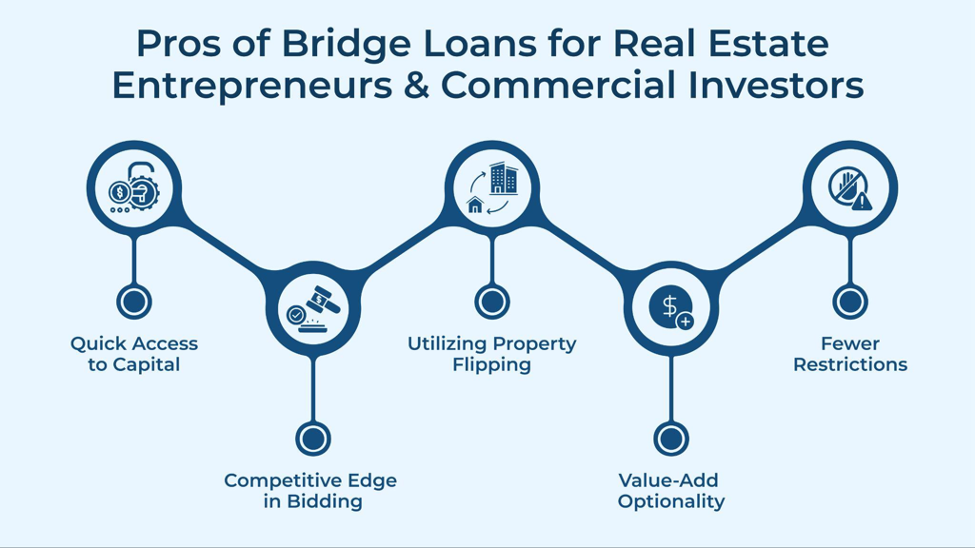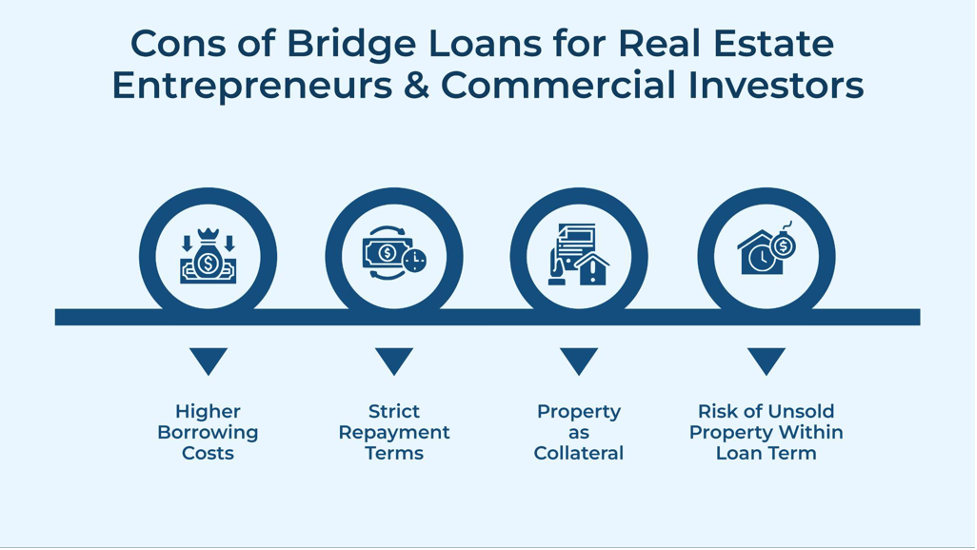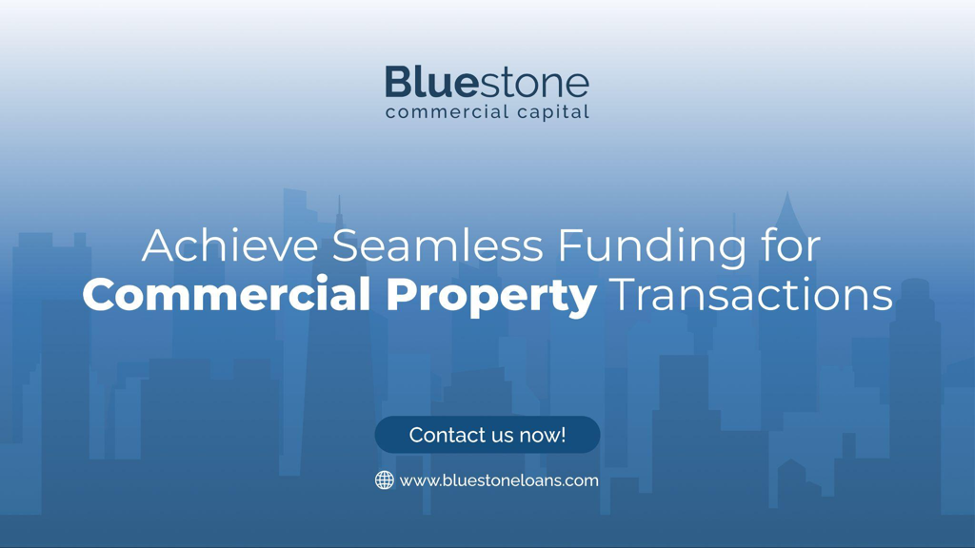
Imagine finding the perfect property for your business, but there’s a catch—you haven’t sold your existing one yet. In commercial real estate, waiting could mean losing the opportunity. This is where a bridge loan comes in.
Bridge loans provide short-term financing to secure a new property before selling your current one. They offer speed and flexibility when conventional loans aren’t an option. But this convenience comes at a price—higher interest rates, shorter repayment terms, and financial risks that may not suit every borrower.
Before committing to a bridge loan, weighing the benefits against the potential risks is essential. While they offer flexibility and speed, they also come with financial obligations that may not suit every borrower.
So, are bridge loans a smart move for your business or real estate portfolio? In this blog, we’ll break down the pros and cons to help you decide if they align with your financial strategy.
Pros of Bridge Loans for Real Estate Entrepreneurs & Commercial Investors

Bridge loans are helpful for investors looking to secure deals before long-term financing is arranged. Here are a few benefits of bridge loans:
1. Quick Access to Capital
Bridge loans speed up the process. Conventional loans can take weeks or even months to get approved. The delay can cause investors to miss out on valuable real estate opportunities. Bridge loans provide fast funding, often within days, allowing investors to act quickly.
For real estate entrepreneurs and commercial investors, timing is everything. Whether you need to secure a property before a competing buyer or move forward with renovations without delay, bridge loans offer a financial lifeline. The quick approval process allows you to close deals without being held back by slow traditional financing. This speed can differ between securing a high-potential investment or losing it to someone else.
2. Competitive Edge in Bidding
Sellers often prioritize buyers who can close quickly in a competitive real estate market. Regular mortgage approvals take time, which can put investors at a disadvantage. Bridge loans allow you to make stronger, cash-like offers with faster closing timelines, making you a more attractive buyer.
This advantage is essential for real estate entrepreneurs and commercial investors to outbid competitors who rely on slower financing, increasing your chances of securing high-value properties. With the ability to close deals quickly, you position yourself as a serious buyer, giving you an edge in fast-moving real estate transactions.
3. Utilizing Property Flipping
Bridge loans provide real estate investors the financial flexibility to acquire and renovate properties without delays. Instead of waiting for conventional financing, investors can secure a bridge loan to purchase a distressed property, complete renovations, and sell it for a profit—all within a short time frame.
For fix-and-flip investors, this means less waiting time and more opportunities to take on multiple projects. You can fund the purchase and rehab costs by leveraging a bridge loan to increase your return on investment. Once the property is sold, you can repay the loan and move on to the next deal, keeping your business growing efficiently.
4. Value-Add Optionality
Bridge loans offer a way to finance property renovations without waiting for traditional loan approvals. Real estate investors often find properties that require upgrades before they can be sold or rented at a higher value. A bridge loan provides quick access to funds, allowing investors to start rehab immediately. This is especially useful for distressed properties that need repairs before qualifying for long-term financing.
With a bridge loan, investors can cover both the purchase price and renovation costs, ensuring the project moves forward without delays. Once the renovations are complete, the improved property can be refinanced with a conventional mortgage or sold for a profit. This strategy helps investors increase property value quickly and maximize returns.
Whether minor upgrades or significant structural changes, bridge loans provide the financial support to turn a fixer-upper into a high-value investment property.
5. Fewer Restrictions
Unlike regular mortgages, which involve strict underwriting guidelines and lengthy approval timelines, unregulated bridge loans bypass many bureaucratic hurdles. This allows investors to secure funding quickly, which is essential for time-sensitive deals.
With fewer restrictions, real estate entrepreneurs and commercial investors can access capital without extensive documentation. This benefits those purchasing distressed properties or unconventional assets that may not qualify for standard financing. The reduced red tape means investors can focus on their projects rather than getting bogged down by paperwork.
However, working with reputable lenders is essential to ensuring transparency and fair terms.
Cons of Bridge Loans for Real Estate Entrepreneurs & Commercial Investors

Before committing to bridge loans, real estate entrepreneurs and commercial investors must weigh the costs and challenges. Understanding these drawbacks helps them make informed financial decisions. Here are a few cons of bridge loans they must be aware of:
1. Higher Borrowing Costs
Bridge loans have higher interest rates than conventional mortgages. Lenders charge a premium because these loans are short-term and carry more risk. In addition to interest, borrowers may face origination fees, closing costs, and other administrative charges that add to the overall expense.
These costs can cut profit margins for real estate entrepreneurs and commercial investors, especially if the property doesn’t sell or refinance quickly. Investigating these expenses is crucial when calculating the potential return on investment. If the project takes longer than expected, the cost of borrowing can increase significantly, making it harder to generate the desired profits.
2. Strict Repayment Terms
Bridge loans have short repayment periods, usually about twelve months. This tight timeline means borrowers must have a clear exit strategy, such as selling a property or securing long-term financing. If the plan falls through or the market slows down, meeting the repayment deadline can become stressful.
For real estate entrepreneurs and commercial investors, delays in renovations, property sales, or refinancing approvals can create financial strain. Some lenders may offer extensions, but these often come with additional fees and higher interest rates. Failing to repay on time could lead to penalties or foreclosure on the collateral property.
3. Property as Collateral
Bridge loans require borrowers to use their property as collateral, which is a potential risk. If you cannot repay the loan within the agreed timeframe, the lender has the right to seize the property. This can be a significant concern if market conditions change or an expected sale falls through.
Putting up an asset as collateral ties up valuable equity. If multiple properties are utilized, it increases financial exposure. While bridge loans provide quick access to capital, the risk of losing an investment property makes it essential to have a solid repayment plan.
4. Risk of Unsold Property Within Loan Term
A significant risk of a bridge loan is that your property doesn’t sell within the loan’s twelve-month term. If the sale takes longer than expected, you could struggle to repay the loan on time, leading to financial strain.
Market fluctuations can impact how quickly a property sells. For instance, in December 2024, nearly 73,000 homes in the U.S. were delisted after failing to find buyers, marking a 64% increase from December 2023.
A slow market, unexpected property issues, or buyer delays can extend the timeline. If the loan term expires before a sale is finalized, you may face penalties, increased interest costs, or the need to seek alternative financing. Therefore, it is essential to have a backup plan if the property doesn’t sell within the expected timeframe.
Achieve Seamless Funding for Commercial Property Transactions
Bridge the gap in your real estate investments with Bluestone Commercial Loans. Our tailored loan solutions help you move fast in a competitive market.
- Bridge Loans – Get quick access to capital to secure properties while waiting for permanent financing or a sale.
- Fix-and-Flip Loans – Finance property purchases, renovations, and resale with ease.
Why choose Bluestone?
- Fast approvals and funding to meet tight deadlines.
- Competitive rates and flexible terms.
- Minimal paperwork with a streamlined process.
- Dedicated loan specialists to guide you.
Don’t miss out on critical opportunities. Apply now and keep your commercial real estate goals on track!

